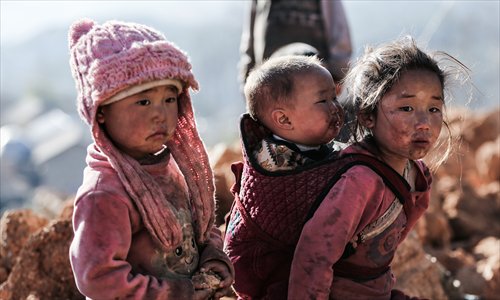HOME >> CHINA
Motivated official sweeps away his village’s narcotics problem
Source:Xinhua-Global Times Published: 2016/7/4 19:28:01

Orphans wearing dirty clothes are pictured in a poor village in Daliang Mountain, the Liangshan Yi Autonomous Prefecture, Southwest China's Sichuan Province, November 27, 2014. Photo: IC
When Wang Hong was elected Party chief of Gudu, in Southwest China's Sichuan Province, the village was notorious for drug trafficking.
Bordering Yunnan Province, the remote village lies on a trafficking route that stretches from the "Golden Triangle" in Southeast Asia into China. Heroin spread like a virus along the route after border trade opened in the 1980s.
China faces an epidemic of drugs from overseas increasingly penetrating the country, with about 90 percent of heroin and methamphetamine tablets seized in 2015 originating in the Golden Triangle, according to a drug report released in February.
Villagers had been struggling to make a living for generations. Wang, now 48, remembers that he and his five brothers did not even have shoes when they were children.
A number of villagers were lured into the illegal drug trade, while others became addicts.
"There might have been five or six families in my village that were dealing drugs back in 2007. Users from nearby villages all came here to buy," said Wang.
He began waging a personal war against drugs when he was recruited by the local committee of the Communist Party of China (CPC) and won the village chief election.
"The village was deserted. Those who dealt drugs got arrested, some of whom were sentenced to death and others spent many years in jail. Those who used drugs either used up their money or contracted HIV. Either way, their elderly parents and young children were left without care," he said. "I just could not continue to stand by and do nothing."
Clean money
Wang, who ran a quarry at the time, had been one of the few villagers to find a clean way to make money. Even before he took the Party chief post, he had tried to help former addicts and offered them jobs.
After his rise to authority in the village, Wang increased his anti-drug efforts. He persuaded village elders to publish a village pact banning the use and trade of drugs. He also set up a vigilante team, which worked closely with the police to report suspected drug activity.
As more villagers tried to make an honest living, Wang took it upon himself to help them.
Ar'erniuniu, a former small-time drug dealer, could not find work after serving 10 years in jail and returning to Gudu a few years ago.
Knowing that he had learned to drive a tractor in prison, Wang helped him get a loan of 20,000 yuan ($3,000) to buy a tractor and start a transportation business.
"It is really much better to earn the money in an upstanding way. You don't need to watch your back," said Ar'erniuniu, who has paid back the loan and rebuilt his house.
Over the past decade, Wang has helped more than 80 villagers secure loans.
"I feel more proud seeing the whole village change for the better than I do when I'm making money myself," he said. He quit his quarry business after taking the Party job.
Today, drug use and trafficking have virtually disappeared from Gudu. In 2012, using government funds and some money raised by residents, the village built modern houses, paved the roads and upgraded other infrastructure.
Many grass-roots officials like Wang are trying hard to make a difference at their posts, but some are not competent. The CPC leadership is aware that the abilities of officials at this level may significantly affect governance, especially in less developed regions.
Last year, the CPC Central Committee dispatched 176,000 Party officials to villages, mostly in remote and less developed regions. It also distributed about 116 million yuan ($17.4 million) to 680 poverty-stricken counties to train village Party officials.
Increasing violence
China seized 79 tons of domestically-made illegal drugs including meth and ketamine in 2015, accounting for 77 percent of the amount of total drugs seized in the country, according to a report released by the National Narcotics Control Commission (NNCC) in February.
The number of gun-related drug cases and instances of armed drug trafficking and violent resistance to law enforcement by drug dealers increased in 2015, which poses a huge threat to drug enforcement action, Liu Yuejin, vice commissioner of the NNCC, at a press conference in Beijing in February.
Chinese police have arrested about 134,000 suspects linked to some 113,000 drug-related crimes over the past year, the NNCC revealed on Sunday.
Xinhua-Global Times
Newspaper headline: Defeating drugs
Posted in: Society